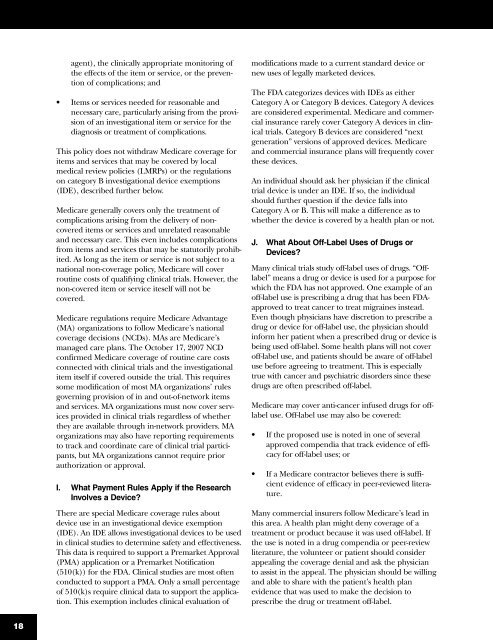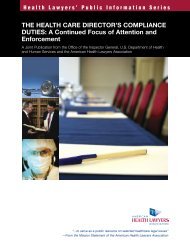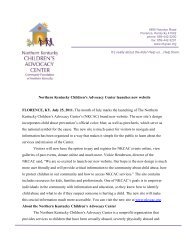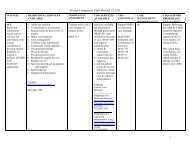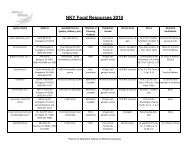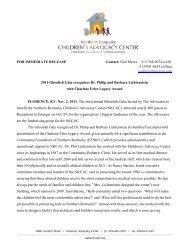Medical Research: A Consumer's Guide for Participation
Medical Research: A Consumer's Guide for Participation
Medical Research: A Consumer's Guide for Participation
Create successful ePaper yourself
Turn your PDF publications into a flip-book with our unique Google optimized e-Paper software.
agent), the clinically appropriate monitoring of<br />
the effects of the item or service, or the prevention<br />
of complications; and<br />
• Items or services needed <strong>for</strong> reasonable and<br />
necessary care, particularly arising from the provision<br />
of an investigational item or service <strong>for</strong> the<br />
diagnosis or treatment of complications.<br />
This policy does not withdraw Medicare coverage <strong>for</strong><br />
items and services that may be covered by local<br />
medical review policies (LMRPs) or the regulations<br />
on category B investigational device exemptions<br />
(IDE), described further below.<br />
Medicare generally covers only the treatment of<br />
complications arising from the delivery of noncovered<br />
items or services and unrelated reasonable<br />
and necessary care. This even includes complications<br />
from items and services that may be statutorily prohibited.<br />
As long as the item or service is not subject to a<br />
national non-coverage policy, Medicare will cover<br />
routine costs of qualifying clinical trials. However, the<br />
non-covered item or service iteself will not be<br />
covered.<br />
Medicare regulations require Medicare Advantage<br />
(MA) organizations to follow Medicare’s national<br />
coverage decisions (NCDs). MAs are Medicare’s<br />
managed care plans. The October 17, 2007 NCD<br />
confirmed Medicare coverage of routine care costs<br />
connected with clinical trials and the investigational<br />
item itself if covered outside the trial. This requires<br />
some modification of most MA organizations’ rules<br />
governing provision of in and out-of-network items<br />
and services. MA organizations must now cover services<br />
provided in clinical trials regardless of whether<br />
they are available through in-network providers. MA<br />
organizations may also have reporting requirements<br />
to track and coordinate care of clinical trial participants,<br />
but MA organizations cannot require prior<br />
authorization or approval.<br />
I. What Payment Rules Apply if the <strong>Research</strong><br />
Involves a Device?<br />
There are special Medicare coverage rules about<br />
device use in an investigational device exemption<br />
(IDE). An IDE allows investigational devices to be used<br />
in clinical studies to determine safety and effectiveness.<br />
This data is required to support a Premarket Approval<br />
(PMA) application or a Premarket Notification<br />
(510(k)) <strong>for</strong> the FDA. Clinical studies are most often<br />
conducted to support a PMA. Only a small percentage<br />
of 510(k)s require clinical data to support the application.<br />
This exemption includes clinical evaluation of<br />
modifications made to a current standard device or<br />
new uses of legally marketed devices.<br />
The FDA categorizes devices with IDEs as either<br />
Category A or Category B devices. Category A devices<br />
are considered experimental. Medicare and commercial<br />
insurance rarely cover Category A devices in clinical<br />
trials. Category B devices are considered “next<br />
generation” versions of approved devices. Medicare<br />
and commercial insurance plans will frequently cover<br />
these devices.<br />
An individual should ask her physician if the clinical<br />
trial device is under an IDE. If so, the individual<br />
should further question if the device falls into<br />
Category A or B. This will make a difference as to<br />
whether the device is covered by a health plan or not.<br />
J. What About Off-Label Uses of Drugs or<br />
Devices?<br />
Many clinical trials study off-label uses of drugs. “Offlabel”<br />
means a drug or device is used <strong>for</strong> a purpose <strong>for</strong><br />
which the FDA has not approved. One example of an<br />
off-label use is prescribing a drug that has been FDAapproved<br />
to treat cancer to treat migraines instead.<br />
Even though physicians have discretion to prescribe a<br />
drug or device <strong>for</strong> off-label use, the physician should<br />
in<strong>for</strong>m her patient when a prescribed drug or device is<br />
being used off-label. Some health plans will not cover<br />
off-label use, and patients should be aware of off-label<br />
use be<strong>for</strong>e agreeing to treatment. This is especially<br />
true with cancer and psychiatric disorders since these<br />
drugs are often prescribed off-label.<br />
Medicare may cover anti-cancer infused drugs <strong>for</strong> offlabel<br />
use. Off-label use may also be covered:<br />
• If the proposed use is noted in one of several<br />
approved compendia that track evidence of efficacy<br />
<strong>for</strong> off-label uses; or<br />
• If a Medicare contractor believes there is sufficient<br />
evidence of efficacy in peer-reviewed literature.<br />
Many commercial insurers follow Medicare’s lead in<br />
this area. A health plan might deny coverage of a<br />
treatment or product because it was used off-label. If<br />
the use is noted in a drug compendia or peer-review<br />
literature, the volunteer or patient should consider<br />
appealing the coverage denial and ask the physician<br />
to assist in the appeal. The physician should be willing<br />
and able to share with the patient’s health plan<br />
evidence that was used to make the decision to<br />
prescribe the drug or treatment off-label.<br />
18


